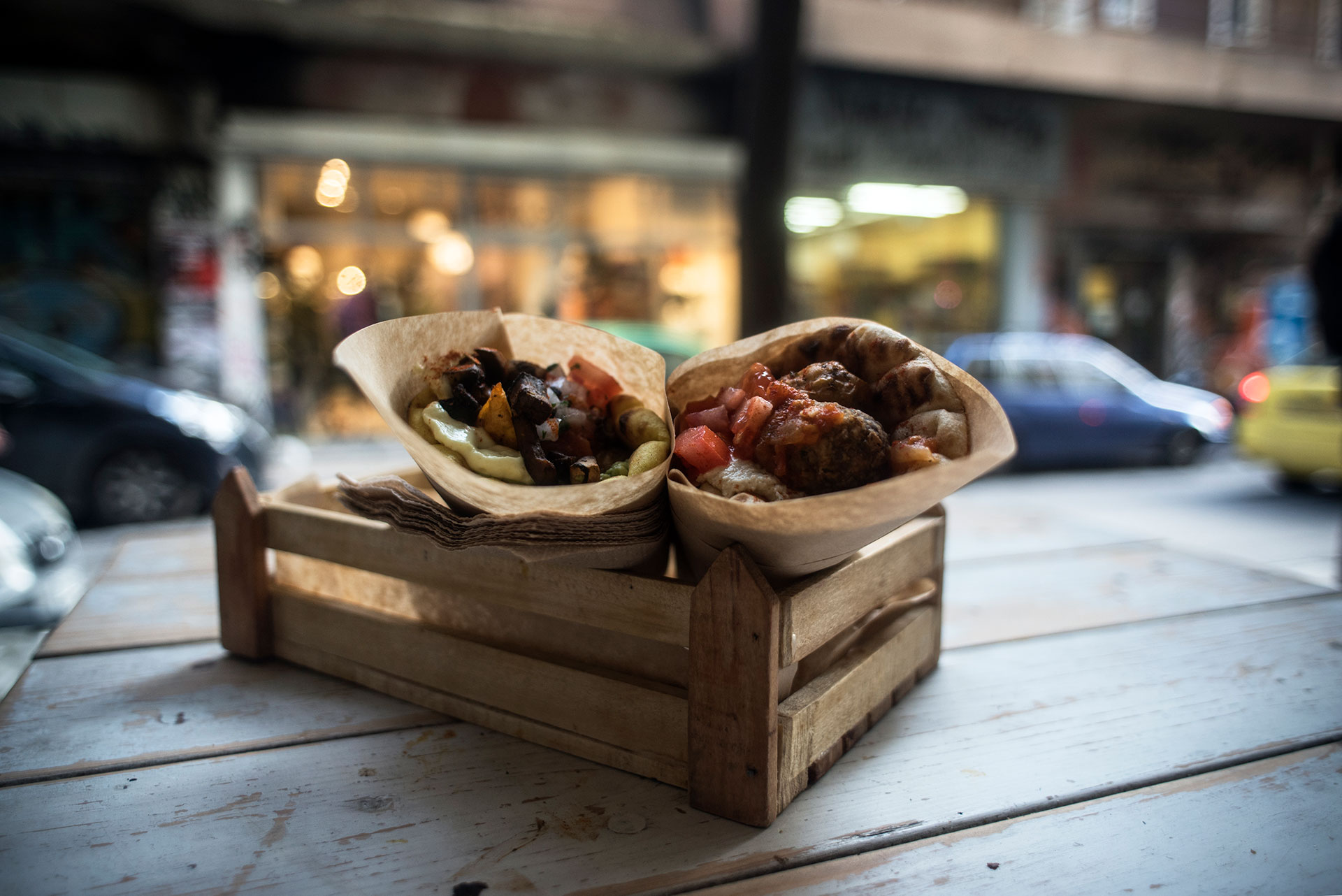Menu
Install the app
How to install the app on iOS
Follow along with the video below to see how to install our site as a web app on your home screen.
Note: This feature may not be available in some browsers.
You are using an out of date browser. It may not display this or other websites correctly.
You should upgrade or use an alternative browser.
You should upgrade or use an alternative browser.
Greek Food, Cooking and Recipe Community
Falafel gyros are not traditional but theyre great for vegetarians!
- Thread starter blopez34
- Start date
1 - 6 of 6 Posts
Blue & White
Member
How is a falafel or vegetarian a Greek food or recipe?I love making these for my friends who are vegetarian!But I prefer pork Gyor myself, a little more meaty and traditional LOL
View attachment 824
Does anyone know a Greek that is a vegetarian? Does that person even exist?
Vangelis
Active member
Here are a few from https://en.wikipedia.org/wiki/History_of_vegetarianismHow is a falafel or vegetarian a Greek food or recipe?
Does anyone know a Greek that is a vegetarian? Does that person even exist?
Pythagoras and some of his followers:
The followers of Pythagoras (called Pythagoreans) did not always practice strict vegetarianism, but at least their inner circle did.
and
In the Platonic Academy the scholarchs (school heads) Xenocrates and (probably) Polemon pleaded for vegetarianism. In the Peripatetic school Theophrastus, Aristotle's immediate successor, supported it. Some of the prominent Platonists and Neo-Platonists in the age of the Roman Empire lived on a vegetarian diet. These included Apollonius of Tyana, Plotinus, and Porphyry. Porphyry wrote a treatise On abstinence from beings with a soul, the most elaborate ancient pro-vegetarian text known to us.
Among the Manicheans, a major religious movement founded in the third century AD, there was an elite group called Electi (the chosen) who were Lacto-Vegetarians for ethical reasons and abided by a commandment which strictly banned killing. Common Manicheans called Auditores (Hearers) obeyed looser rules of nonviolence.
Vangelis
Active member
Have you ever tried mushroom souvlaki? I have made them and they are amazing! I use the portobello mushrooms for a richer taste. In Athens my favourite souvlaki place is Cookoomela.

 cookoomela.gr
cookoomela.gr

Αρχική - CΟΟΚοoMÈLA GRILL
Το 1o Vegan Σουβλατζίδικο! Μεσογειακή Φυτική Διατροφή – Όλα Χειροποίητα με Αγνά Υλικά. Σας περιμένουμε από κοντά Θεμιστοκλέους 43-45, Εξάρχεια
That sounds so good! I will definitely visit when I'm in Athens, so nice to see that more Greek places are offering vegan options or going fully vegan!Have you ever tried mushroom souvlaki? I have made them and they are amazing! I use the portobello mushrooms for a richer taste. In Athens my favourite souvlaki place is Cookoomela.

Αρχική - CΟΟΚοoMÈLA GRILL
Το 1o Vegan Σουβλατζίδικο! Μεσογειακή Φυτική Διατροφή – Όλα Χειροποίητα με Αγνά Υλικά. Σας περιμένουμε από κοντά Θεμιστοκλέους 43-45, Εξάρχειαcookoomela.gr
k_tsoukalas
Administrator
Falafel is not traditionally Greek, but I do see them being sold in Greece here and there. Most Greeks, as far as I can tell, don't put labels on how they eat and just eat what is fresh, delicious, and in season, and Falafels can be part of that! Thanks for sharing this.
1 - 6 of 6 Posts
JOIN THE DISCUSSION AND READ OTHER GREEK INFO:
What are the most famous Greek cheeses?
- knicks_fan87
- Greek Food Forum
- Replies: 0
I've recently embarked on a culinary quest to explore the rich and diverse world of Greek cheeses. From the tangy feta found in traditional Greek salads to the sizzling delights of halloumi, Greece's cheese culture seems incredibly vast and flavorful. 
I'm reaching out to this knowledgeable community to ask: What are the most famous Greek cheeses that you've tried or heard of?
Are there any particular varieties that are a must-try or any hidden gems that rarely escape the borders of Greece? And if you have any delicious recipes or pairings to share, I'd love to hear about those too!
I'm reaching out to this knowledgeable community to ask: What are the most famous Greek cheeses that you've tried or heard of?
Are there any particular varieties that are a must-try or any hidden gems that rarely escape the borders of Greece? And if you have any delicious recipes or pairings to share, I'd love to hear about those too!
What do you serve for Greek Easter?
- acamp7
- Greek Food Forum
- Replies: 0
With Greek Easter just around the corner, I'm getting excited to celebrate with family and friends. One of my favorite parts of this holiday is the delicious feast we enjoy together. I'm curious to hear what dishes everyone serves at their Greek Easter gatherings.
Whether you have cherished family recipes passed down through generations or you're trying something new this year, I'd love to hear about it. From traditional favorites like lamb and tzatziki to mouthwatering desserts like baklava and tsoureki, every dish adds to the festive atmosphere.
So, what's on your Greek Easter menu this year? Are there any must-have dishes or special treats that you look forward to? Feel free to share recipes, tips, or simply your excitement for the upcoming celebration. Let's swap ideas and inspire each other to make this Greek Easter memorable!
Us? We are grilling a leg of lamb and serving it with lemon potatoes and fasolakia. For dessert we are doing some kind of a chocolate cake and of course koulourakia.
Whether you have cherished family recipes passed down through generations or you're trying something new this year, I'd love to hear about it. From traditional favorites like lamb and tzatziki to mouthwatering desserts like baklava and tsoureki, every dish adds to the festive atmosphere.
So, what's on your Greek Easter menu this year? Are there any must-have dishes or special treats that you look forward to? Feel free to share recipes, tips, or simply your excitement for the upcoming celebration. Let's swap ideas and inspire each other to make this Greek Easter memorable!
Us? We are grilling a leg of lamb and serving it with lemon potatoes and fasolakia. For dessert we are doing some kind of a chocolate cake and of course koulourakia.
Current food trends in Greece?
- dpappas87
- Greek Food Forum
- Replies: 0
I understand that Greece is just like other countries where there might be food trends, new dishes, etc to enjoy.
I'm looking to understand more about the latest trends that are currently shaping it. I'm particularly interested in how traditional Greek recipes are being reimagined by modern chefs, how regional variations are gaining popularity, or if there's a rise in any particular ingredients or cooking methods.
Is anyone here keeping tabs on contemporary movements in Greek food? Maybe you've dined at a restaurant that surprised you with a modern twist on a Greek classic, or you've come across new food blogs with innovative recipes.
The cuisine of Greece is as much about the traditional recipes we all love as it is the trends and the way the cuisine moves forward!
I'm looking to understand more about the latest trends that are currently shaping it. I'm particularly interested in how traditional Greek recipes are being reimagined by modern chefs, how regional variations are gaining popularity, or if there's a rise in any particular ingredients or cooking methods.
Is anyone here keeping tabs on contemporary movements in Greek food? Maybe you've dined at a restaurant that surprised you with a modern twist on a Greek classic, or you've come across new food blogs with innovative recipes.
The cuisine of Greece is as much about the traditional recipes we all love as it is the trends and the way the cuisine moves forward!
Can you make your own rusks?
- redsoxdw_
- Greek Food Forum
- Replies: 0
I love Cretan Dakos!
There's something about the combination of the crunchy rusk soaked with the juice of ripe tomatoes, topped with fresh cheese and olive oil, that has me hooked!
However, given that I live in an area where it's challenging to find authentic Cretan rusks, I'm contemplating on whether I can bake my own at home. I'm curious if anyone here has attempted to make rusks suitable for dakos from scratch.
I know I can order then online. I tried this, and they didn't survive the shipping too well.
There's something about the combination of the crunchy rusk soaked with the juice of ripe tomatoes, topped with fresh cheese and olive oil, that has me hooked!
However, given that I live in an area where it's challenging to find authentic Cretan rusks, I'm contemplating on whether I can bake my own at home. I'm curious if anyone here has attempted to make rusks suitable for dakos from scratch.
I know I can order then online. I tried this, and they didn't survive the shipping too well.
Greek Halva Recipe to Enjoy During Lent?
- d_kakavouli
- Greek Food Forum
- Replies: 2
I love Halva year round but I often see it a lot during Lent. My recipe doesn't seem Lent friendly to me. Any ideas on how I can adapt it?
Ingredients:
Ingredients:
- 1 cup semolina
- 1 cup granulated sugar
- 1/2 cup unsalted butter
- 2 cups water
- 1/4 teaspoon ground cinnamon
- 1/4 cup chopped almonds or walnuts (optional)
- 1/4 cup raisins (optional)
- In a medium-sized saucepan, melt the butter over medium heat.
- Add the semolina to the melted butter and stir continuously for about 5-7 minutes, or until the semolina turns golden brown and begins to emit a nutty aroma.
- While stirring the semolina mixture, gradually add the sugar and continue to cook for another 2-3 minutes until the sugar is fully incorporated.
- Slowly pour in the water, stirring constantly to avoid lumps from forming. Be careful as the mixture may splatter.
- Reduce the heat to low and continue stirring the mixture until it thickens to a porridge-like consistency, about 5-7 minutes.
- Stir in the ground cinnamon and optional chopped nuts and raisins, if using.
- Remove the saucepan from the heat and let the halva rest for a few minutes to thicken further.
- Serve the halva warm or at room temperature, either as a dessert or a sweet breakfast treat.
Sign up for a free account and share your thoughts, photos, questions about Greek food, travel and culture!
WorldwideGreeks.com is a free online forum community where people can discuss Greek food, travel, traditions, history and mythology.
Join Worldwide Greeks here!
Join Worldwide Greeks here!
JOIN COMMUNITY FOR FREE
LOGIN TO YOUR ACCOUNT



